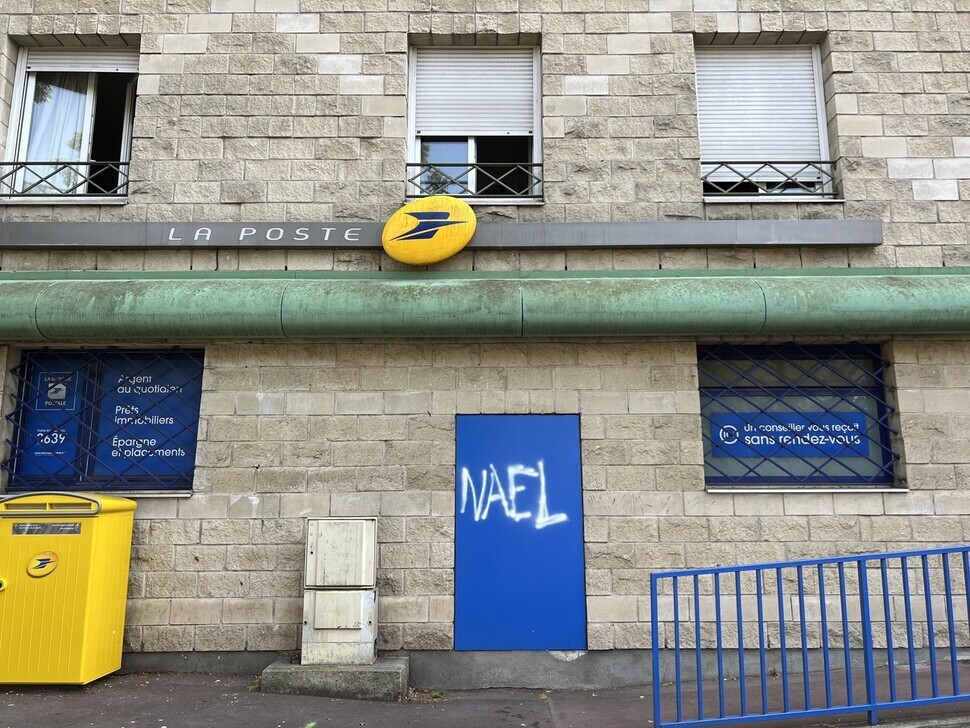hankyoreh
Links to other country sites 다른 나라 사이트 링크
[Reporter’s notebook] With police empowered to shoot, can there be justice for France’s immigrants?

I arrived in Nanterre, a suburb of Paris, on Monday. I was there to cover the riots that had spread around the country following the fatal police shooting of a 17-year-old immigrant of Algerian descent.
While tracking the protests that had gone on for days following the killing of Nahel Merzouk on June 27, there was a word I kept spotting scrawled on the walls of the city: “Justice.”
What is the justice these people so desperately crave? It didn’t take long to arrive at the answer.
“The situation today is no different than it was 40 years ago,” a community elder in Nanterre told me. “The police still treat immigrants as vermin.”
In 1983, 40 years ago, a group of 100,000 Algerian immigrants set off on a march from Marseille, demanding equality and denouncing racism. The marchers arrived in Paris in December. French President François Mitterrand promised to strictly prosecute hate crimes, which were on the rise in the early 1980s.
But the reality didn’t change. “There’s still a double standard in society and the police when it comes to prosecution of immigrants,” the elder told me.
The same situation applied with the riots 18 years ago in October 2005. A 15-year-old and a 17-year-old were evading police questioning in the suburbs of Paris when they were fatally electrocuted. Demonstrations against the police’s racism and overaggressive response ended up spreading throughout France over a roughly three-week period.
During the riots, demonstrators set fire to cars, daycare centers, schools, and gymnasiums. Many young people with African immigrant backgrounds took part.
A similar situation occurred with the recent protests. Around 1,200 of the 4,000 people arrested in the week after June 27 were minors.
Why have the same things kept happening over the past decades? Umit Donmez, a 41-year-old reporter and Turkish immigrant who spoke to the Hankyoreh, cited problems with France’s amendment of its homeland security law.
The new legislation broadened the conditions allowing the police to use firearms. Article 435-1 listed several situations in which the military and police were allowed to use weapons.
Experts criticized the law as vague, noting how much room it left open for interpretation. Indeed, instances of police shooting at vehicle drivers roughly quintupled after the amendment was implemented. Last year alone, 13 people were fatally shot after refusing to comply with police ID checks.
“The law enabled them to shoot anyone who does not cooperate with the police,” Donmez said.
“The people who died have come from banlieue [suburb] cities like Nanterre, and they’ve been people of African descent, including Arabs, Moroccans and Algerians,” he added. “Most of them were not guilty of anything.”
The only difference between their situation and Nahel’s is the existence of video footage showing the police’s mistake. This explains why the message to “always be filming” has become a kind of catchphrase in France these days.
The people I talked to on the street in Nanterre said more or less the same thing: that it was not the first time something like this happened, and that it was no longer surprising.
The factors include decades’ worth of discrimination, injustice, inheritance of poverty, and the absence of a ladder allowing for class mobility. The only difference is that some are reacting with resignation and helplessness, and others with discontent and rage.
“Maybe our parents’ generation lived without complaint — just eating, sleeping and working — but we reject discrimination and voice our complaints,” said a 44-year-old second-generation Algerian resident named Sami.
One Nanterre elder shared, “Immigrant children can’t dream of anything beyond becoming an Uber driver. It’s not that they don’t work hard — the reality is that there’s no point in working.”
Donmez said, “Immigrants are unable to afford their own apartments while they’re receiving minimum wage to work on building the Olympic stadium in Paris. They do the work that white French people refuse to do, and they suffer discrimination on top of that.”

Violence is never justified. But it is necessary to examine exactly what is behind the anger. Otherwise, it becomes impossible to avoid the same tragedies repeating themselves.
By Noh Ji-won, Berlin correspondent
Please direct questions or comments to [english@hani.co.kr]

Editorial・opinion
![[Column] How tragedy pervades weak links in Korean labor [Column] How tragedy pervades weak links in Korean labor](https://flexible.img.hani.co.kr/flexible/normal/500/300/imgdb/original/2024/0703/8717199957128458.jpg) [Column] How tragedy pervades weak links in Korean labor
[Column] How tragedy pervades weak links in Korean labor![[Column] How opposing war became a far-right policy [Column] How opposing war became a far-right policy](https://flexible.img.hani.co.kr/flexible/normal/500/300/imgdb/original/2024/0702/5017199091002075.jpg) [Column] How opposing war became a far-right policy
[Column] How opposing war became a far-right policy- [Editorial] Korea needs to adjust diplomatic course in preparation for a Trump comeback
- [Editorial] Silence won’t save Yoon
- [Column] The miscalculations that started the Korean War mustn’t be repeated
- [Correspondent’s column] China-Europe relations tested once more by EV war
- [Correspondent’s column] Who really created the new ‘axis of evil’?
- [Editorial] Exploiting foreign domestic workers won’t solve Korea’s birth rate problem
- [Column] Kim and Putin’s new world order
- [Editorial] Workplace hazards can be prevented — why weren’t they this time?
Most viewed articles
- 110 days of torture: Korean mental patient’s restraints only removed after death
- 2[Column] How opposing war became a far-right policy
- 3Nine dead in Seoul after car plows into pedestrians
- 4[Editorial] Korea needs to adjust diplomatic course in preparation for a Trump comeback
- 5In the blink of an eye, an unthinkable crash turned a night out into a nightmare
- 6Experts cast doubt on driver’s claim that sudden unintended acceleration caused deadly crash
- 7Families, friends mourn loved ones cut down in prime in deadly car crash
- 8Korea to create dedicated population strategy ministry to combat low birth rate, aging society
- 9Democrats seek to impeach 4 prosecutors, including those tied to probes into Lee Jae-myung
- 10KCC chief resigns to avoid impeachment, the second in 7 months